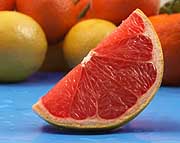| Home A B C D E F G H I J K L M N O P Q R S T U V W X Y Z |
|
Home |
Grapefruit Nutrition Facts
Studies confirm that by adding grapefruit or grapefruit juice to your daily diet, you can shed those unwanted pounds. A 12-week pilot study, led by Dr. Ken Fujioka, monitored weight and metabolic factors of the 100 men and women who participated in the Scripps Clinic “Grapefruit Diet” study. On average, participants who ate half a grapefruit with each meal lost 3.6 pounds, while those who drank a serving of grapefruit juice three times a day lost 3.3 pounds. However, many patients in the study lost more than 10 pounds. The most important active ingredient in grapefruit that helps us to lose weight is naringin, a flavonoid compound that gives grapefruit its characteristic bitter flavor and blocks the uptake of fatty acids into cells to prevent our bodies from effectively using carbohydrates. But grapefruit confers so many more health benefits than its ability to help us shed pounds. “Grapefruit packs in lots of nutritional goodies, supplying a heaping dose of vitamin C, folic acid, and potassium — all of which protect your heart,” says Dr. Barry Sears in his book The Top 100 Zone Foods. “Pink grapefruit is relatively rich in anti-oxidants, and ruby red grapefruit provides an added bonus: lycopene, the phytochemical that helps prevent the ‘bad’ (LDL) cholesterol from oxidizing and damaging artery walls.” Grapefruit also contains pectin, a form of soluble fiber that has been shown in animal studies to slow down the progression of atherosclerosis. Pigs fed a high-cholesterol diet plus grapefruit pectin had 24% narrowing of their arteries, while pigs fed the high-cholesterol diet without grapefruit pectin had 45% narrowing. In humans, drinking three 6-ounce glasses of grapefruit juice a day was shown to reduce the activity of an enzyme that activates cancer-causing chemicals found in tobacco smoke. In rats whose colons were injected with carcinogens, grapefruit and its isolated active compounds (apigenin, hesperidin, limonin, naringin, naringenin, nobiletin) not only increased the suicide (apoptosis) of cancer cells, but also the production of normal colon cells. |
|
|
|
|
|
Glossary References Links Contact
|